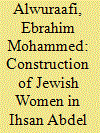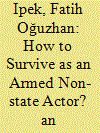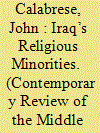|
|
|
Sort Order |
|
|
|
Items / Page
|
|
|
|
|
|
|
| Srl | Item |
| 1 |
ID:
186313


|
|
|
|
|
| Summary/Abstract |
Numerous studies have examined the decades-old Saudi-Iranian rivalry, which has played out in various regional arenas, notably Syria, Iraq, Yemen, Lebanon, and the Gulf. This article explores the place that Kurdistan Regional Government (KRG) in northern Iraq occupies within this rivalry. As the KRG’s foreign relations have attracted scholarly attention since the late 1990s, the article examines the Saudi Arabia–KRG relations in the post-2003 Iraq War, with a special focus on growing Iranian influence in Iraq. The end of Saddam Hussein’s rule and the subsequent rise of Shiite-dominated governments in Baghdad has shaken the regional balance, bringing out Iran as an influential actor in the Middle East. This laid the foundation for new understandings in the Saudi regional policy as Riyadh emphasized its relations with Iraq and the KRG, which became a crucial factor that can balance and imbalance power in the Middle East. It argues that common concerns for security and relative gains paved the way for a closer relationship between Riyadh and Erbil to counter threats emanating from both Iran and ISIS. Through case-specific information to those interested in Kurdish politics and the Middle East, it not only delves into the driving forces behind Riyadh-Erbil relations but also aims to present the Saudi interpretation of the 2017 Kurdish referendum.
|
|
|
|
|
|
|
|
|
|
|
|
|
|
|
|
| 2 |
ID:
186310


|
|
|
|
|
| Summary/Abstract |
The article examines Ihsan Abdel Quddous’s literary texts that deal with Egyptian Jewish women to explore how Egyptian Jewesses figure in these texts to disrupt, disturb, or offset prevailing historical and fictional discourses and explore his attitude toward Egyptian Jews in general and Jewish women in particular. Deploying post-colonial feminist theory, the article argues that in Quddous’ works, Jewish women represent a highly-educated and liberal community with fluid, transnational identities that serve to foil exclusionary discourses, and that Quddous increasingly has given Egyptian Jewish women, more than any other Arab writer of the period, a voice and an active role in his works. As a result, he has articulated their hopes, fears, and needs in a period dominated by political and social instability. The article aims at identifying and categorizing major tropes and characteristics pertaining to the portrayal of Jewish women in Ihsan Abdel Quddous’ fiction, and how these portrayals adhere to or play on the universal stereotypes of Jews.
|
|
|
|
|
|
|
|
|
|
|
|
|
|
|
|
| 3 |
ID:
186314


|
|
|
|
|
| Summary/Abstract |
This article examines the case of the Syrian Democratic Union Party (Partiya Yekîtiya Demokrat or PYD) to explain the survival strategies of the non-state armed actor (NSAA). Although the Middle Eastern State System remarkably remained stable after the end of Mandates, the legitimacy of states has been eroded by a combination of colonial legacy, neo-patrimonialism, and authoritarianism, laying the seeds for the rise of non-state challengers to states. At the beginning of the Syrian uprising, the PYD did not fight against the Syrian regime but established its autonomy in northern Syria by taking advantage of the chaos. Using the process-tracing method, the article explains the survival of the PYD until the territorial defeat of the so-called Islamic State and offers parameters of the territorial logic, its organizational structuring, and relations with the states to explain the survival strategies of the PYD. Finally, the study concludes that while the territorial and organizational structuring logics of the NSAA shape its strategies, its complex relationship with states determines its survival.
|
|
|
|
|
|
|
|
|
|
|
|
|
|
|
|
| 4 |
ID:
186311


|
|
|
|
|
| Summary/Abstract |
The Middle East and North Africa (MENA) is often described as the cradle of the three Abrahamic faiths and Iraq as a land “where faith was born.” But the past two decades have dealt a severe, possibly fatal blow to religious communities that were once vibrant and integral parts of Iraq’s social fabric—and perhaps to the very idea of pluralism in the region. Ensuring the continued presence of religious minority communities is vital to preserving Iraq’s social diversity and nurturing a culture of pluralism. Iraq’s best hope to save its vanishing minorities from extinction and revive religious pluralism lies in the Iraqi Region of Kurdistan (IRK). Fully incorporating displaced non-Muslim components of Iraqi society into host communities in the IRK while preserving their distinctive collective identity would advance the prospects for the survival of religious minorities and the future of pluralism in the IRK, the country at large, and the wider region.
|
|
|
|
|
|
|
|
|
|
|
|
|
|
|
|
| 5 |
ID:
186312


|
|
|
|
|
| Summary/Abstract |
Qatar slowly opened up to the democratic system. In 1963, the Qatari Sheikh made some concessions and allowed Municipal Council to be elected by all Qatari males. However, it appears to have faded from view without any noticeable impact. After the independence, Sheikh Khalifa believed that elections were neither necessary nor useful and his son, Sheikh Hamad, began to reform the country in this area. In April 2003, Qatari citizens voted on a constitution that included an election. Until 2021, Doha postponed plans for a partially elected Shura Council. Instead, members of the body, the top advisory body for the government, have been appointed by the Emir. On October 2, 2011, Qataris began voting in the Emirate’s first legislative election. The results were an example of the conservative view of the Qatari population. The conservative atmosphere also appeared in the sessions of another elected advisory council, the Central Municipal Council (CMC) and every reform or change can be initiated only by the leadership, specifically the Emir. The conservative atmosphere and the significant role of the Emir in the change appeared especially in the question of the women in the democratic process. However, during the years, the Al-Thani continued to closely monitor the implementation of the elections and make sure things would not go out of hand. Moreover, political participation limited different factions of the Al-Thani family and prominent families in the Emirate, sometimes connected through marriages to the ruling family.
|
|
|
|
|
|
|
|
|
|
|
|
|
|
|
|
| 6 |
ID:
186309


|
|
|
|
|
| Summary/Abstract |
As part of the master’s course in the School of International Studies of Jawaharlal Nehru University, we study minorities in the Middle East. Whenever opportunities occur, we also engage with experts on ethnic minorities. A few years ago, we had a Druze official from the Israeli Embassy who spoke about the community, whose members live in the geographically contiguous Israel, Jordan, Lebanon, and Syria. He clarified our curiosity regarding their religious beliefs and social structure and the challenges in Israel.
|
|
|
|
|
|
|
|
|
|
|
|
|
|
|
|
|
|
|
|
|